- Home
- Gore Vidal
Thieves Fall Out Page 10
Thieves Fall Out Read online
Page 10
“How far is it from the shore to the inn?” he asked.
“Almost five kilometers.”
“That’s quite a ways. Is there any kind of carriage on the other side?”
“Not now. We walk,” said Osman cheerfully.
The boat landed on the western bank just as the water had begun to get seriously deep in the bottom. Pete hopped ashore, followed more sedately by the dragoman.
There followed, then, a quarrel between Osman and the boy. The burden of it, Pete discovered, had to do with the boy’s waiting for them on that side of the river.
“He is superstitious,” said Osman contemptuously, “afraid of evil spirits. I tell him he must wait.”
“Not for me. I’ll spend the night at the inn.”
“But for me,” said Osman. “I wish to go back this night to Luxor.”
Pete solved the problem like Solomon; he tore a piaster note in half and gave it to the boy. “Tell him you’ll give him the other half when he takes you back.”
This delighted Osman; the boy complained loudly, finally bursting into tears and tearing his hair in the best Arab tradition, but they were firm and left him sitting on the bank.
“He will wait,” said Osman confidently, as they walked up the embankment to the road.
The road was a winding one, very dusty and rutted from cartwheels. It wound in and out among groves of olive trees. The land on this side of the river was rolling, not flat like the eastern side. They walked a long time without speaking. Occasionally a muffled figure would pass them on the road, silent, swift-moving, and involuntarily Pete’s hand would go to the revolver in his pocket. Osman noticed this.
“Very wise, Sir Wells. Many thieves on these roads at night. They kill so easy.” And he chuckled, an unpleasant sound.
Pete felt better when they had left the tree-lined section of the road and moved up into the hills, into an open stretch of land where the road was straight. No ambush on this road, he thought, looking to left and right at the farmhouses across the dry stubbled fields crisscrossed with narrow ditches containing stagnant river water.
They did not pause until they reached the end of this straight road, when, huge in the night, two enormous statues loomed, the largest Pete had ever seen, one on each side of the road. It was an uncanny sight, in the silver glare.
“What the hell are those things?” he asked, standing at the base of one of the statues. Both were alike: a seated man wearing the royal headdress of ancient Egypt.
“The Colossi, Sir Wells,” said Osman, assuming his professional guide’s voice. “Among the wonders of the world, builded by the great king Amenhotep to his glory.”
So clear was the light that Pete could even make out the face of the dead king, a heavy face with a curiously gentle smile that made him uneasy, as though the smile were meant for him: a warning.
“Let’s get going,” he said, lowering his voice for no reason as they walked between the statues toward the low hills bordering sharp cliffs.
Half a mile beyond the statues they came to a village of mud huts, forty or fifty shacks placed haphazardly on the top of one of the hills. Even before they actually saw the village, they could smell it: wood smoke, urine, goats—the usual odors of an Arab community.
Osman was nervous, Peter could see, and he wondered why. It was understandable on the road, unprotected, at the mercy of hidden thieves, but here in civilization, relatively speaking, they were safe.
“Please to be quiet,” whispered Osman, leading the way through the huts, keeping away from the central ones, which circled a fire at which many of the native men were gathered, though the night was warm. There was no sign of electricity anywhere. The lighted hovels contained only flickering candles or weak lanterns.
They moved unnoticed through the outskirts of the village.
But then, almost free of the last irregular row of huts, Pete stepped on a soft dark shape that, by its hair-raising yowl, turned out to be a child asleep in the street.
There was wild confusion. The child ran screaming toward the center of the village. Women, unveiled for the night, appeared in doorways. Men came rushing toward them, their robes billowing behind them, firebrands in their hands.
“Quick!” Osman pulled Pete after him. They leaped off the hill’s summit and into a shallow ravine. Breathless, a little stunned by the impact, Pete limped after Osman, who was heading up the ravine, just as the light of torches fell across them from above and a high shouting began as the excited Arabs sighted strangers.
Pete followed Osman, thankful for the moonlight, stumbling over boulders as they made their way among a maze of ravines cut out of the limestone hill. In a few minutes they were out of range of the villagers, though they could still hear the shouting as the men searched the ravine they had just left.
Finally, at the mouth of what looked like a cave, Osman stopped, breathing heavily. “We…safe,” he gasped. “No follow…here.” They sat for some minutes on the dusty stone, resting.
Pete looked up at the huge black sky, speckled with brilliant stars. He had the sensation of lying at the bottom of a trench, of a grave, even; for in this place there was almost no vegetation, only porous white limestone, pale as bones in the moonlight.
Finally, when he could breathe easily, Pete asked, “Where are we?”
“Among the tombs,” said the old man.
Pete looked about him. Farther down the ravine in which they sat, he could see two more oblong openings, like the one immediately behind them. “Those?” he asked, pointing to one of the caves.
Osman nodded. “Not the kings, though. Rich men, nobles are buried here. Long ages ago the tombs are sealed, but Europeans come and open them and steal the treasures.” There was an unexpected note of bitterness in the old man’s voice.
“Where are the kings?”
“In a valley to the west of here. We see it in daytime perhaps.”
“Why did they chase us?”
Osman shrugged. “It is night. They are afraid. They hate strangers, and white men, and bad spirits.”
“They thought we were ghosts?”
“Who knows? The torches they carried are supposed to keep them from harm at the hands of the dead.”
“The dead,” repeated Peter thoughtfully.
“Now we must go on to the inn. It is longer journey now.” Osman got to his feet slowly. Pete did the same. He was surprised to find that he was cold, though he had been running and the night was warm, like a dark soft blanket all about them.
Osman led him through a labyrinth of similar ravines. Several acres, perhaps more, of limestone had been worn away by some forgotten flood, leaving behind a series of confusing trenches, a dozen feet deep, containing the tombs of the old Egyptians.
It was a strange sensation, like walking in a roofless corridor, for the steep bare slopes were like walls, and the world above, except for the black sky, was no longer visible. There was no sound but the heavy echo of their footsteps and the distant yapping of wild dogs.
Eternity passed and still there was no end to it. Pete kept his eye on the North Star and discovered soon enough that Osman was off course. They were heading southwest instead of northeast
He stopped; the old man turned around. “Sir Wells is tired?” He spoke in his ordinary voice and the sound of it was as loud as a shot.
“Shut up,” whispered Pete furiously.
“There is no danger now,” said the other, lowering his voice.
“We’re going in the wrong direction. We’re going south.”
Osman nodded, undisturbed. “It is so. We must go backward to go forward in the tombs.”
“Then why don’t we climb out of here and get back on the road? There is a road, isn’t there?”
“Of course, Sir Wells, but we are miles away from it now. We are above the Libyan Inn. We move south toward it. We are safest in the tombs, because no Egyptians will come here at night, fearing them,” and he gestured with one long hand at the dark entrance nearest t
hem, a narrow doorway in the rock perhaps five feet tall.
“Why aren’t you afraid?” asked Pete, and he lit a cigarette, soothed suddenly by the taste of American tobacco.
“I am educated man,” said Osman stiffly. “I do not fear such things. Besides,” he added, holding up a small pendant that he wore about his neck inside his robe, “I wear this. Annubis, god of the dead, protects me.” His wide, long-toothed smile gleamed in the pale light as Pete perfunctorily examined the tiny figure of the hawk-headed god.
“How much longer will it take?” he asked as they began their journey again, Osman leading the way nimbly over fallen rock. There was not room enough in most places for two men to walk abreast.
“An hour, Sir Wells, no more.” He cocked his head skyward at the moon and said, “Soon she will be gone.”
“The moon?”
“Yes. It will be difficult to travel then, in the dark. You have no light?”
“Only a cigarette lighter, which isn’t much use,” said Pete.
Osman stroked his chin thoughtfully. “Perhaps the dark is better. Stars give light.” He paused. “What was that?” he whispered, fear in his voice.
Pete strained but could hear nothing. He was about to say something when the old man silenced him with a gesture. “Quick!” he whispered. “In here.” And he ducked into one of the caves. Pete followed him.
He was forced to crouch a little to get inside the door, but once inside he could stand erect with ease. He lifted one hand and touched the smooth stone overhead; the ceiling was only a few inches above his head.
He could hear Osman breathing hoarsely beside him in the blackness. He tried to say something but the old man snorted softly, warningly. They stood for several long minutes in the dark close chamber. Then Osman whispered, “Light.”
Pete fumbled through his pockets until he found his cigarette lighter. He snapped it on. To his surprise the walls were brilliant with paintings, as bright and glowing as they had been three thousand years before. Every inch of wall was painted. At the end opposite the door by which they had entered was another, smaller opening.
Osman looked out into the ravine. Satisfied, he turned to Pete. “All is well,” he said.
“What did you hear?”
“I thought I heard the men walking, but I was wrong.” He grinned in the flaring light and pointed to the door at the back of the chamber. “It is there they place the mummy.”
Pete shuddered. “Let’s get the hell out of here.” A warm blast of air snuffed out his lighter. He cursed sharply and lit it again, just as a tall figure stepped through the door of the burial room, the face shrouded in a robe.
Osman shrieked harshly like a frightened parrot. The lighter went out again. Pete made a dash for the door, striking his head in a sharp blow that made him reel. Clutching his forehead, momentarily blinded, he staggered out into the ravine.
Then they were upon him.
At first he could not tell how many they were. He fought blindly, swinging wildly from left to right, striking hard flesh and bone with his fists while hands clutched at him, tried to throw him off balance.
His head cleared as he struggled. He was able to break clear for a moment, and in that moment he saw three men in Arab dress closing in on him.
In the moonlight the knife that one was carrying flashed against the black sky.
He ran. But it was no use. Rocks tripped him. He stumbled, fell, got to his feet; then they had him surrounded, were closing in on him.
He fought desperately but they were too heavy. They overpowered him with the weight of their bodies, heavy Arab bodies swathed in robes. He got only a blurred impression of the faces. All were strangers to him, dark, big-nosed men with black gleaming eyes.
Two of them held him on his back, their bodies like stones on his chest, holding him flat to the ground though he still twisted and fought, his arms pinioned at his sides. The third man stood over him for a moment, and then, with a hard hand, struck him across the face. His neck cracked. Stars swam in his head and for a moment he nearly lost consciousness; but then, with an effort, he brought his eyes into focus again. The slap had suddenly cleared his brain. He was no longer an unreasoning trapped animal. He stopped struggling.
“What do you want?” he asked, his own voice sounding far away in his ears.
The Arab who had hit him only grunted. He was going through his pants pockets.
“I haven’t got much money,” said Pete, “but…” As he talked to them, he found he could move his right hand. The Arab holding him on that side lay across his arm and shoulder, but his hand and wrist were left free. It was in the right-hand coat pocket of his jacket that he had put the pistol. Carefully, stealthily, he moved his hand toward the revolver, talking all the time, promising them money if they let him go.
The Arab who had been searching him muttered something to the others. For a second he was afraid they would search his jacket before he could get his hand to the gun, but they were no longer interested in robbing him. The two men holding him threw their weight even more heavily on his chest and belly, holding his arms tight under them. This shift in position brought Pete’s hand closer to the revolver. With a sudden move, he could get to it and fire. With the tips of his fingers he felt the hard metal. His hand was already in the pocket.
When he saw what the Arab was doing, though, he froze in terror, the revolver forgotten.
The man had taken out his long knife and, with a professional twist, cut Pete’s belt in two. The other two got a scissors grip on his legs as his trousers were opened. Then the man raised his knife hand and in a flash of light brought it down.
The rest was confusion. Pete gave a blood-curdling yell and with all his strength grabbed the pistol, firing it without aiming. The shot was like thunder echoing in the stone ravine.
The Arab with the knife stepped back, startled. One man shrieked and the other leaped to his feet. Pete fired again, under cover of the wounded Arab. The one with the knife grasped his belly with both hands; the third scrambled up the side of the ravine and was gone.
Pete shoved clear of the dead man who lay across him. In the moonlight, blood flowed black upon the stone. He got to his feet quickly and, taking careful aim, fired two more shots into the crouched figure of the Arab opposite him. The man rocked back and forth gently and then, with a sound of retching, fell face downward on the ground.
For a long moment Pete stood dazed between the two dead men, his breath coming in great gasps and his head swimming. He was afraid he might be sick, but the nausea passed.
He sat down shakily on a boulder and examined the inside of his thigh where the Arab’s knife had cut him. The blood was flowing fast but the cut, he saw, was not deep, only a scratch. He wadded his handkerchief over the wound and tied it fast with the remains of his belt.
Then, just as he was about to search the dead Arabs, the moon set and the darkness suddenly closed in about him, warm and protecting. By starlight, the white stone glowed dully, and all objects were indistinct and vague against it.
When the bleeding had stopped a little, he got to his feet and climbed, very carefully, the wall of the gully.
He found himself in unfamiliar country. The mountains were close by; the river was at least a dozen miles away. Luxor was a blur of light in the distance, north of where he stood.
Finally he made out, some miles to the south, a cluster of darkened buildings circling a larger one with lighted windows. The light shone steadily: electric light. Since this was the only sign of civilization on his side of the river, he headed toward it, walking slowly over fields of stubble, across shallow irrigation trenches filled with stinking mud and water.
Occasionally he would see figures moving, but when he called out to them to ask his way, they fled without answer into the shadows.
The sky was gray with morning when he reached the Libyan Inn.
Chapter Five
Pete collapsed onto the bed, hardly aware of what was happening. From far away h
e could hear Anna moving about the room, but even the sting of iodine on his leg did not arouse him. Without a word, he fell asleep. He did not open his eyes again until late afternoon. She was standing beside the bed with a tray of food. She smiled. “You haven’t moved for hours,” she said, putting the tray down beside the bed.
“Hours?” he repeated stupidly, his mind still fogged with sleep. He was conscious that the room was hot, that he was sweating uncomfortably. He sat up and she placed a pillow behind him. “What time is it?”
“Nearly four. Come, eat this. You must be weak. I think you lost a lot of blood.”
He glanced at his thigh where the bandage covered the scratch. His trouser leg was stiff with dried blood. He moved his leg carefully, flexing the muscles. Everything worked properly, though there was a soreness about the wound.
Anna sat down on the edge of the bed while he ate. “You gave the inn a great surprise,” she said. “They wanted to know if they should call the police.”
“What did you say?”
“I said it was up to you.”
“Do you think they did?”
“I think so. Does it matter?” She looked at him directly, her blue eyes serious.
He shook his head. “No, I guess not. I object to the attention but that can’t be helped.”
“What happened, Peter?”
He told her, as best he could. Already the wild chase in the tombs seemed like a nightmare only half remembered. She listened intently. When he had finished, unable to recall exactly how he’d got to the inn from the tombs, she asked the obvious question: Had it been planned?
“I don’t know,” he said wearily. “I haven’t any idea. I don’t think the trouble in the village was planned. I mean it was because I stepped on that kid that they started after us, thinking we were evil spirits.”
“But I wonder, Peter, if it was necessary to go through the village at all.”
He hadn’t thought of this. “I’m not sure. I was pretty vague about the geography. I figured Osman knew where he was going.”

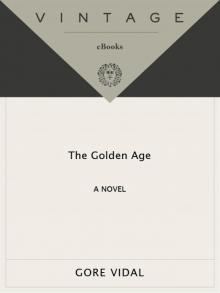 The Golden Age: A Novel
The Golden Age: A Novel Death Before Bedtime
Death Before Bedtime Burr
Burr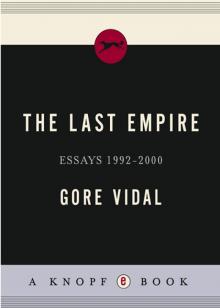 The Last Empire
The Last Empire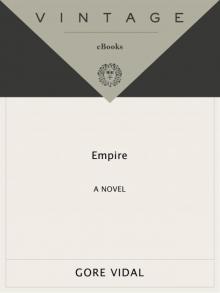 Empire: A Novel
Empire: A Novel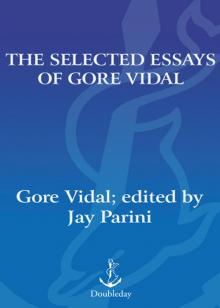 The Selected Essays of Gore Vidal
The Selected Essays of Gore Vidal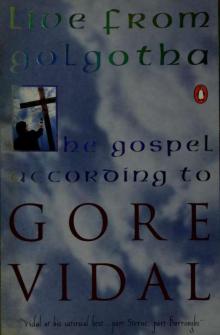 Live From Golgotha
Live From Golgotha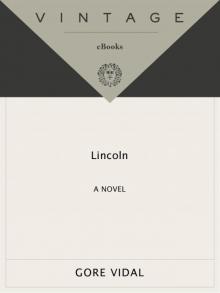 Lincoln
Lincoln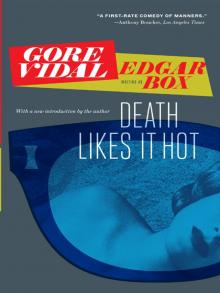 Death Likes It Hot
Death Likes It Hot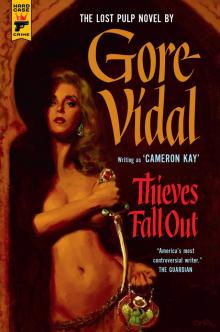 Thieves Fall Out (Hard Case Crime)
Thieves Fall Out (Hard Case Crime) Point to Point Navigation
Point to Point Navigation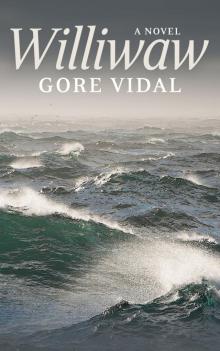 Williwaw
Williwaw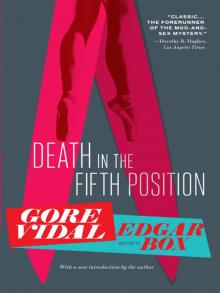 Death in the Fifth Position
Death in the Fifth Position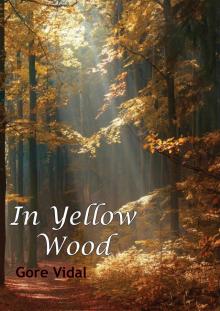 In a Yellow Wood
In a Yellow Wood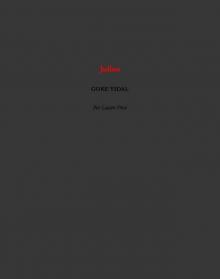 Julian
Julian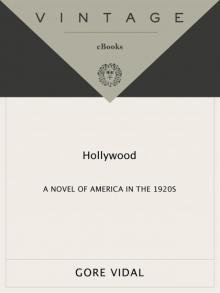 Hollywood
Hollywood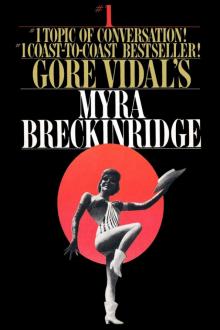 Myra Breckinridge
Myra Breckinridge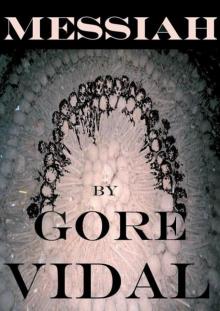 Messiah
Messiah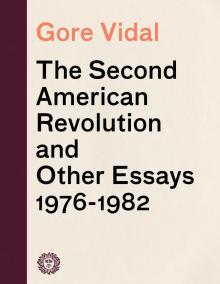 The Second American Revolution and Other Essays 1976--1982
The Second American Revolution and Other Essays 1976--1982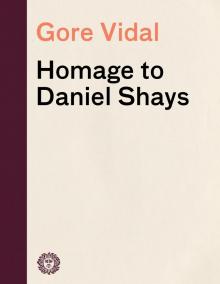 Homage to Daniel Shays
Homage to Daniel Shays Empire
Empire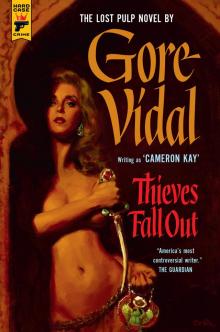 Thieves Fall Out
Thieves Fall Out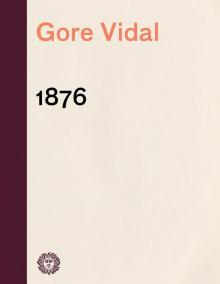 1876
1876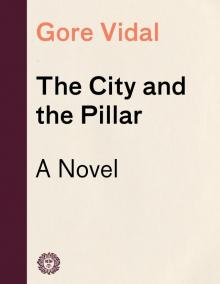 The City and the Pillar
The City and the Pillar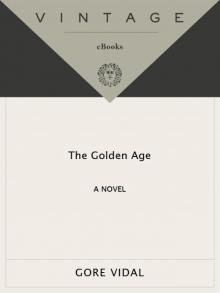 The Golden Age
The Golden Age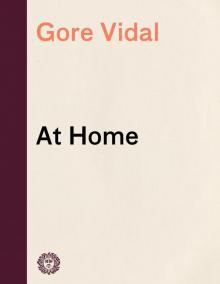 At Home
At Home